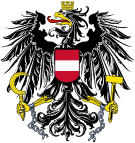| |||||||||||||||||||||||||||||||||||||||||||||||||||||||||||||||||||||||||||
All 183 seats in the National Council 92 seats needed for a majority | |||||||||||||||||||||||||||||||||||||||||||||||||||||||||||||||||||||||||||
|---|---|---|---|---|---|---|---|---|---|---|---|---|---|---|---|---|---|---|---|---|---|---|---|---|---|---|---|---|---|---|---|---|---|---|---|---|---|---|---|---|---|---|---|---|---|---|---|---|---|---|---|---|---|---|---|---|---|---|---|---|---|---|---|---|---|---|---|---|---|---|---|---|---|---|---|
| Opinion polls | |||||||||||||||||||||||||||||||||||||||||||||||||||||||||||||||||||||||||||
| Turnout | 78.8% ( | ||||||||||||||||||||||||||||||||||||||||||||||||||||||||||||||||||||||||||
| |||||||||||||||||||||||||||||||||||||||||||||||||||||||||||||||||||||||||||
| |||||||||||||||||||||||||||||||||||||||||||||||||||||||||||||||||||||||||||
| This article is part of a series on the |
| Politics of Austria |
|---|
 |
Legislative elections were held in Austria on 28 September 2008 to elect the 24th National Council, the lower house of Austria's bicameral parliament.[1] The snap election was called after Austrian People's Party (ÖVP) withdrew from the ruling grand coalition with the Social Democratic Party of Austria (SPÖ) in July.[2] Due to dissatisfaction with the governing parties, the opposition and minor parties were expected to make significant gains. Opinion polling indicated that up to seven parties could potentially win seats.[3][4][5][6]
The SPÖ and ÖVP each suffered their worst election results in history up to this point, losing 6.1 and 8.3 percentage points respectively. The Freedom Party of Austria (FPÖ) and Alliance for the Future of Austria (BZÖ) captured the largest portion of these lost votes, each recording a six and a half-point swing. The Greens took small losses, while Liberal Forum (LiF) and Citizens' Forum Austria (FRITZ) both fell well short of the 4% electoral threshold, defying earlier expectations that they could enter the National Council. The result was perceived as a success for the right-wing populist and Eurosceptic parties.[7]
Following the elections, Wilhelm Molterer resigned as chairman of the ÖVP and was replaced by agriculture minister Josef Pröll. The Greens' federal spokesman Alexander Van der Bellen, who had served since 1997, also resigned and was succeeded by his deputy Eva Glawischnig. Due to the Liberal Forum's failure to win seats, party founder Heide Schmidt and financier Hans-Peter Haselsteiner both announced their retirement from politics. Less than two weeks after the election, BZÖ leader and governor of Carinthia Jörg Haider died in a car accident.
A coalition between the SPÖ and the ÖVP was agreed upon on 23 November 2008 and was sworn in on 2 December 2008.[8]
- ^ "28. September als Neuwahltermin fix" (in German). Orf.at. Retrieved 26 November 2008.
- ^ "BBC NEWS - World - Europe - Austria ruling coalition crumbles". News.bbc.co.uk. 7 July 2008. Archived from the original on 19 December 2008. Retrieved 26 November 2008.
- ^ Bronner Online AG. "derStandard.at". Derstandard.at. Retrieved 26 November 2008.
- ^ "Die Zeit ist reif für einen Umbruch - DiePresse.com". Diepresse.com. Retrieved 26 November 2008.
- ^ "Datum 7-8/08 – Seiten der Zeit: Hajek bloggt: Die Unentschlossenen. Das geheime Wesen". Datum.at. Archived from the original on 25 December 2010. Retrieved 26 November 2008.
- ^ "Listenrekord bei NR-Wahlen - kurier.at". Kurier.at. Archived from the original on 27 February 2012. Retrieved 26 November 2008.
- ^ Pancevski, Bojan (29 September 2008). "Far Right storms election as Austrians back anti-EU rhetoric – Times Online". The Times. London. Archived from the original on 11 October 2011. Retrieved 26 November 2008.
- ^ "New Austrian government takes office". International Herald Tribune. Associated Press. 2 December 2008. Retrieved 11 March 2009.








